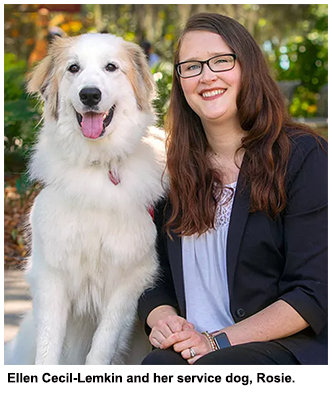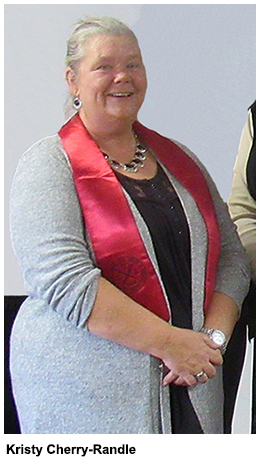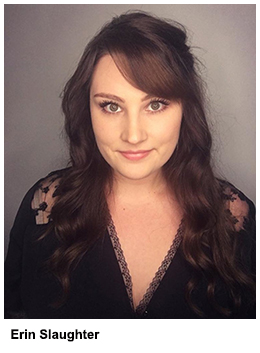Grad students: networking, constructive criticism, attending conferences keys to getting published
By Cristi McKee
The phrase “publish or perish” is something that all master’s and doctoral students have most likely heard. While pursuing an advanced education in their respective fields, at least one common condition guides them: the push to research and publish.
Graduate students in Florida State University’s English department are no different.
For example, recent graduate in the Rhetoric and Composition Program Ellen Cecil-Lemkin (Ph.D. ’20) had a collaborative article published in  September 2020 in College Composition and Communication, a flagship journal for rhetoric and composition. Titled “Enacting a Culture of Access in Our Conference Spaces,” this was the first scholarly article that Cecil-Lemkin has published, after she spent ample time attending conferences for the field, networking with those in the profession, and receiving mentorship and guidance on discipline-specific questions.
September 2020 in College Composition and Communication, a flagship journal for rhetoric and composition. Titled “Enacting a Culture of Access in Our Conference Spaces,” this was the first scholarly article that Cecil-Lemkin has published, after she spent ample time attending conferences for the field, networking with those in the profession, and receiving mentorship and guidance on discipline-specific questions.
While she was the only student or faculty member in the Rhetoric and Composition program that did research in disability studies at FSU, Cecil-Lemkin had the “full support of the faculty” to support her interests, she says. However, to fully immerse herself in the research, she had to network at conferences.
“Whenever I went to conferences, I always made a point to attend sessions that were related to my area of research and to spend time after the sessions talking with the presenters and getting to know them and their research,” she explains. “Which is how I got to know Ruth Osorio and Adam Hubrig (the editors for the symposium collection).”
After attending the November 2019 Feminisms and Rhetorics Conference in Harrisonburg, Virginia, where Cecil-Lemkin present on her dissertation research and attending a number of various disability-related sessions, she met Osorio and Hubrig.
In January 2020, Osorio and Hubrig reached out to her to ask if she was interested in contributing to a symposium on conference accessibility, and she immediately accepted the offer.
Based on her interests, they paired her with her co-author, Leslie Anglesey, whom she previously had met at a conference. The two met a couple of times via video chat to talk about their experiences at conferences and ideas that could be included in a journal article.
During those sessions, they came up with the angle to examine the importance of “quiet rooms.” In “Enacting a Culture of Access in Our Conference Spaces,” Anglesey and Cecil-Lemkin describe a “quiet room” as a “needed space for neurodivergent and disabled scholars,” Cecil-Lemkin says, to go when attending conferences and in need of reprieve.
“We proposed the idea to Ruth and Adam and they encouraged us to write the essay,” Cecil-Lemkin adds.
The result was publication of the co-authors’ article in the September 2020 issue of College Composition and Communication, which can be read online here.
Other graduate students in the FSU Department of English have been through similar publishing experiences. Kristy Cherry-Randle, doctoral candidate in Early American Literature, Erin Slaughter, doctoral student in Creative Writing, and Lemkin shared their thoughts regarding the process. Here is what they had to say.
 At what point in your writing process did you begin to think about getting your pieces published?
At what point in your writing process did you begin to think about getting your pieces published?
Kristy Cherry-Randle: It was during my undergraduate education as a journalism student that the pressure was on to look at publishing. Even during my undergraduate English degree, the faculty never pushed us to publish but it was something that was definitely unspoken, that publishing was an important part of the discipline. In my master’s program they told us that every paper we wrote for classes or otherwise we should write with the intent to publish, although they did not push it or make it a requirement. They did, however, encourage us to send papers out there and try and get published. The same concept is true for my studies as a Ph.D. student, to write every paper with the intent to publish. Most of what I learned about publishing academic work was taught to me as a McNair Scholar. The mission of the McNair Scholars program is to help undergraduate first-generation and underrepresented undergraduates prepare for graduate level degrees. It was during my year as a McNair Scholar that our faculty advisor taught us about the intricacies of publishing in academic journals. We learned to look at the format of various journals in our respective disciplines and mirror style and format. We also learn about which journals were more prestigious than others. During my year long tenure as a McNair Scholar, I conducted my own individual research under the direction of a faculty mentor and was published twice. It was a long, lengthy, and tedious process—but was worth it in the end as it helped to demystify the process of academic publishing.
Erin Slaughter: I think there was a time in the beginning of my writing career when I didn't innately connect writing with the potential for publication, but it's been so long now that I don't really remember what that was like. When I began to pursue writing in a more focused way, I began looking into literary magazines and learning as much as I could about the process of sending work out, and I found (and still find) so much excitement in that exploratory process. I try not to let it affect the writing process itself—it can be futile, and often discouraging, to consider if and when and how a piece might get published when you're still in the middle of writing it—but finding publishers and readers for my work feels like a very entwined part of the creative  process for me. Getting to submit a piece feels like the reward for creating something I'm happy with and think has some amount of artistic value. Of course, there are many, many pieces of my writing that haven't been published or seen by anyone (nor should they be), and pieces I think are some of the best I've ever written that haven't been published. But finding a place to share it is the natural consideration for me as soon as the piece feels finished.
process for me. Getting to submit a piece feels like the reward for creating something I'm happy with and think has some amount of artistic value. Of course, there are many, many pieces of my writing that haven't been published or seen by anyone (nor should they be), and pieces I think are some of the best I've ever written that haven't been published. But finding a place to share it is the natural consideration for me as soon as the piece feels finished.
How do you decide what specifically you would like to submit?
Erin Slaughter: I browse a journal's archives or check out their most recent issue, and as I'm reading, I consider work I have available to submit that may be similar in style, content, voice, theme, or form to what they've recently published. I think doing this kind of quick research is the best way not to waste the editors' time or your own, but sometimes, it's hard to know what editors and readers will connect to. In the end, it's all a shot in the dark, so all you can do is send what you think is your best work.
How did you go about approaching a publisher?
Kristy Cherry-Randle: For me it is not so much about approaching a publisher as it is a journal. I look at the journals that I cite the most [in my research] and see what types of articles they include, what are the formats, and what is the process the journal uses to choose pieces they publish. Each journal has their own process and it is important to understand the journal’s process and requirement when you are polishing your work to publish.
Erin Slaughter: Although I've completed a creative writing M.F.A. and I am now three years into a creative writing Ph.D., by far the most useful advice about how to submit work for publication came from the instructor of my first creative writing class that I took during my junior year of college. He gave us a template for how to construct a cover letter (the format of which I still use) and told us about Entropy Magazine's "Where to Submit" list, which is how I learned to become familiar with different lit journals and the basic guidelines for submitting poetry and prose, and is still the primary source I use to find new opportunities for submitting my work. So I started there: researched journals and the kind of work they like to publish, and if I was excited about the journal and thought my work might be a good fit, I sent it.
What were key factors that you considered when deciding whether or not to approach a publisher?
Erin Slaughter: I have several main factors I look at now when checking out a new journal or press I'm considering submitting to: What kind of work do they publish, and is it work I enjoy and feel like my work vibes with? Do they have a pleasant and easily navigable website design (important for all journals, I think, but especially ones where your work will be displayed online)? What is their web presence like (journals who work hard to promote their contributors on social media is a good sign, while journals whose last social media posts were from a year ago or longer are suspect)? Do they pay their contributors? What is their mission, and what do they stand for? What is their reputation in the literary community? Overall, the main criteria I look for is if they publish quality writing, and if they seem consistently engaged with their readers, contributors, and the literary community.
When submitting work for possible publication, how many pieces do you typically submit?
Erin Slaughter: I kind of go wild—I submit a piece to as many publishers at a time that I think could be a good fit for it. It helps that I write in all genres—poetry, fiction, and nonfiction—because if I really love a journal, but submissions aren't open in a given genre category at the time, or I don't think they'd be interested in the work I have to send out in a particular genre, chances are that I still have something else I could send them. It fluctuates, and I go through phases of submitting a lot, and then pausing to write a lot but not submit for a while, and at times I'm just way too strapped financially to spend any money at all on submission fees (which a majority of journals require for standard submissions, and virtually all of them require for contests and book manuscript submissions) but at any given time I usually have somewhere between 40-100 submissions out.
Did you face any nervousness or uncertainty during this process? If so, how did you deal with it?
Kristy Cherry-Randle: There is always nervousness and uncertainty while you are writing and trying to get published. The work you spent so much time with and you have put forth so much effort into polishing is under a blind scrutiny every time you send your writing out. I think more so during my time as a Ph.D. student I am far more connected with the subjects that I write about. There is a lot of time, effort, and care put into writing my papers—it is more personal, and when you are putting something that you feel so connected with out there to be scrutinized and criticized there will be huge amount of anxiety every time you submit work for publication. I also have a lot of uncertainty and anxiety that my writing is good enough to go into a journal where a scholar I admire publishes frequently.
What are some differences you found when preparing to submit to a journal as opposed to preparing for writing a dissertation?
Kristy Cherry-Randle: The biggest difference is the audience. My dissertation—I am writing to my committee and to potential employers. Journal audiences are academics and I have no idea who they are. You know they are in the same area of study as you are but you have no idea what their idiosyncrasies are to avoid.
What is some advice you have for those looking to get their work published in any form?
Kristy Cherry-Randle: Don’t give up! Be ready to accept criticism in a constructive way and be willing to make changes.
Ellen Cecil-Lemkin: I would say that attending conferences and networking is really important. While talking to scholars who are well established in the field is important for opportunities for mentorship, it's also valuable to network with those who are still developing their careers. Those types of scholars are likely to think of you when it comes time to putting together an edited collection or when they want to collaborate on a piece. I also think it's really important to get outside perspectives on your writing. There's only so far that you can go as a writer without getting outside feedback. Getting feedback from your peers can really strengthen and focus a piece.
Erin Slaughter: The first step is to learn about the journals that are out there, because there truly is a market for every kind of writing, you just have to find where your people are. I also think staying engaged in the literary community, supporting other writers, attending events, and contributing what you can is an important part of it. If possible, take the opportunity to intern in publishing or read submissions for a literary journal; seeing the wide range of work that gets submitted and understanding the process from the editors' side is an invaluable experience. Although I see submitting as an extension of the creative process and tend to get excited about it, I know most other writers view it as extra work, or a burden that takes time away from their actual writing. In a lot of ways, though, getting into the habit of submitting often is the best way to begin building a writing career and making connections in the literary community. Rejections can be discouraging, but writers have to keep in mind that rejections often don't mean anything about how good or bad your writing is—editors reject pieces for all kinds of reasons that can sometimes have little to do with the quality of the writing itself, and never have to do with you personally (unless you're rude or pushy in your cover letter or correspondence, in which case, don't be). The only path to success is a lot of perseverance. It's okay to feel disappointed by a rejection, but you can't let it stop you from moving forward. My strategy is to keep a folder on my computer with bookmarked submission periods or contests, and when I'm bored or procrastinating on other work, I go into that folder and send something. If I get a rejection, I send out another submission somewhere else to take its place. I think overall, it's about learning the literary landscape, and getting into the habit of submitting regularly, in an informed and enthusiastic way. And staying hopeful that someone will eventually connect with your writing, because someone will.
Cristi McKee is an English major, on the editing, writing, and media track, with a minor in business.
Follow the English department on Instagram @fsuenglish; on Facebook facebook.com/fsuenglishdepartment/; and Twitter, @fsu_englishdept
